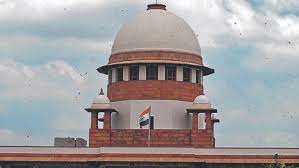Upholding the conviction of the appellant under Sections 363, 366-A, 376(A), 376(2)(i), 376(2)(j), 376(2)(k), 376(2)(m), 302 and 201 of the Indian Penal Code1, and Section 5(m), 5(i) read with Section 6 of Protection of Children from Sexual Offences Act 20122, and confirming the sentence of death imposed on the appellant (Para 1)
That the entire trial for such serious offences has been completed within a span of 15 days i.e. from 27th April, 2018 (when the charge-sheet was filed) to 12th May, 2018 (when the Judgment was delivered by the Sessions Court). Referring to the order-sheet recorded by the trial court from 27th April, 2018 to 12th May, 2018, learned senior counsel would submit that the appellant has not been afforded a fair trial depriving him of his valuable legal rights. It is also argued that the DNA report (Ex.P-72) has not been proved in accordance with law. The forensic experts were not examined during the trial, nor the report was put to the accused for admission or otherwise. (Para 5)
A close reading and scrutiny of the order-sheet recorded by the Trial Court, as stated above in brief, would manifest that the accused was not provided an opportunity to engage a counsel of his choice and instead his submission was recorded that he desires to be defended by a counsel appointed through legal aid. From the very beginning, the trial proceeded on dayto- day basis except on Saturday and Sunday and all the witnesses examined by the prosecution were produced without issuing summons. (Para 8)
In a case of this nature, the trial was conducted on dayto- day basis and the order-sheet does not record that copies of statement of witnesses were supplied to the accused or his counsel, it is not known as to whether the defence counsel was supplied all the requisite material basing which he could have advanced his final arguments. (Para 9)
The Order-sheet would thus clearly indicate that the trial was conducted in a hurried manner without providing ample and proper opportunity to the defence counsel, who was engaged through legal aid, to prepare himself effectively. It is also to be noted that copies of DNA Report, FSL Report and Viscera Report were presented before the Court during the course of trial on 04.05.2018. (Para 10)
The concept of fair trial entails familiar triangulation of interests of the accused, the victim, and the society. (Para 15)
The principle of “judicial calm” in the context of a fair trial needs to be elaborated for its observance in letter and spirit. In our view, in the hallowed halls of justice, the essence of a fair and impartial trial lies in the steadfast embrace of judicial calm. It is incumbent upon a judge to exude an aura of tranquillity, offering a sanctuary of reason and measured deliberation. In the halls of justice, the gavel strikes not in haste, but in a deliberate cadence ensuring every voice, every piece of evidence, is accorded its due weight. The expanse of judicial calm serves not only as a pillar of constitutional integrity, but as the very bedrock upon which trust in a legal system is forged. It is a beacon that illuminates the path towards a verdict untainted by haste or prejudice, thus upholding the sanctity of justice for all. (Para 17)
In the case at hand, the prosecution is based on circumstantial evidence in which the prosecution has to prove each link in the chain of circumstantial evidence and the important chains in the link are DNA report, FSL report and Viscera report. When the reports were challenged by the accused before the High Court, it was brushed aside by observing that even if the authors of the reports were not called for evidence, in terms of Section 293 Cr.P.C., the reports are not open to question as the defence had an opportunity to cross-examine the authors of the reports during the trial. In our considered view, the High Court was not correct in saying that the defence had an opportunity to cross-examine the experts. The trial has been conducted on day-to-day basis wherein the accused, who was in jail and defended by a counsel from legal aid, was compelled by the Trial Court to produce defence witness of his own in one day. It was impossible for the accused himself to produce Dr. Anil Kumar Singh and Dr. Kamlesh Kaitholiya, the authors of the Reports (Ex.P-72), in one day because the said experts are government servants and could not have attended the Court at the request of an accused in jail. The Trial Court treated the accused as if he is carrying a magic wand which is available to produce highly qualified experts, who are government servants, on a phone call. There was no opportunity, in the real sense, to the appellant to cross-examine the experts. (Para 21)
For all the afore-stated reasons, we are of the considered view that the Trial Court conducted the trial in a hurried manner without giving proper opportunity to the accused to defend himself. Therefore, the Judgment of conviction and sentence passed by the Trial Court and affirmed by the High Court is hereby set aside and the matter is remitted back to the trial court for de novo trial by affording proper opportunity to the appellant to defend himself. The trial court and the District Legal Services Authority, Indore, are directed to provide assistance of a senior counsel to the appellant to contest the trial on his behalf. (Para 22)
SUPREME COURT OF INDIA
2023 STPL(Web) 359 SC
[2023 INSC 936]
Naveen @ Ajay Vs. State Of Madhya Pradesh
Criminal Appeal Nos. 489-490 of 2019-Decided on 19-10-2023
https://stpllaw.in/wp-content/uploads/2023/10/2023-STPLWeb-359-SC.pdf







